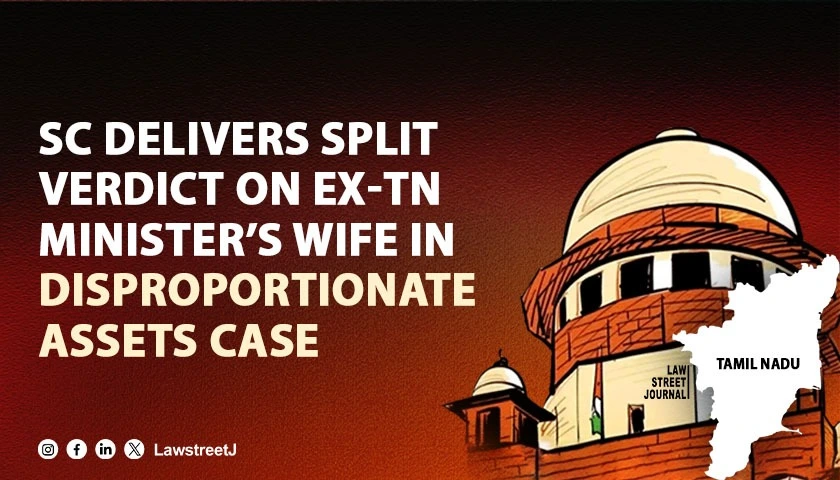NEW DELHI: The Supreme Court's two judges on Wednesday gave a split judgment on a plea by P Nallammal, wife of late A M Paramasivam, former Tamil Nadu Minister and AIADMK leader in respect of her conviction and one year jail term in a disproportionate case.
Justice Sudhanshu Dhulia upheld her conviction and sentence while Justice Ahsanuddin Amanullah acquitted her in the corruption case.
The bench of both the judges ordered for placing the matter before the Chief Justice of India for appropriate orders and sending it before a larger bench.
Paramasivam was an elected Member of the Tamil Nadu Legislative Assembly during the period June 16, 1991 to May 09, 1996. He also served as the Minister for Labour Welfare, Government of Tamil Nadu during the period between May 17, 1993 to May 09, 1996. It was alleged acquisition of properties beyond known pecuniary resources was to the extent of Rs 38,72,545 during the check period i.e., between June 16, 1991 to May 09, 1996.
On the appeal against the Madras High Court's judgment, Justice Dhulia said that the prosecution succeeded in establishing that the accused were in possession of assets hugely disproportionate to their known sources of income.
The prosecution had successfully discharged its initial burden and the accused miserably failed to discharge this burden of satisfactorily explaining the source of income behind the ‘disproportionate assets’, he said.
"We must also keep in mind that insofar as corruption cases under section 13(1)(e) of the PC Act are concerned, the burden of proof is reversed, and it becomes the responsibility of the accused to dislodge the presumption against him," Justice Dhulia said.
Justice Amanullah, on the contrary, said, there is absolutely no evidence on record, much less any evidence to satisfy the standard of proof beyond reasonable doubt to establish that the the appellant conspired or colluded with or intentionally aided her husband in committing offences under Sections 13(2) r/w 13(1)(e) of the Prevention of Corruption Act.
"Therefore, we hold that the acts of the appellant do not fall within the ambit of Section 107 of the IPC and in such circumstances, it would be unsafe to sustain her conviction with the aid of Section 109 of IPC," he said.
In his judgment, Justice Dhulia said, "In the opinion of my brother Justice Amanullah, it was the appellant’s husband (accused No.1) who had accumulated assets disproportionate to his known sources of income and the prosecution could not prove that the appellant was aware that the money from which assets were being purchased or bought in her name, were from unlawful sources. It is this finding that I disagree with".
The appellant was an accomplice in the commission of the crime when she allowed her husband to register the properties in her name, Justice Dhulia said.
Justice Amanullah, on his part, said, a solitary circumstance of name-lending, such as the one at present, cannot lead us to draw and sustain an inference which unerringly points to the guilt of the appellant.
"There has to be something more in the form of positive evidence to satisfy the essential requirements for the offence of abetment. Life and liberty are not things to be trifled with on the basis of conjectures and surmises," he said.
Justice Dhulia, however, said, where there is abetment by a close relative in corruption matters, such as the spouse in the present case, the culpability of such a relative has to be tested by the surrounding circumstances and his/her overall conduct.
"This is because, in such cases, there would rarely be direct evidence of abetment. This factor has to be kept in mind," he said.
Justice Amanullah said, under bonafide belief, the appellant has tried to defend the acquisition of the assets trying to explain the sources from various means which cannot lead to the presumption in law that she was party ab initio to such illegal acquisitions as ultimately she is a housewife.
Justice Dhulia, however, pointed out the High Court noted that from the year of marriage, i.e.1983, till 1991, there was no acquisition of immovable property either in the name of the appellant or accused No.1, her husband.
Her husband became MLA in the year 1991 and minister in the year 1993 and then the acquisition of properties, moveable and immovable, also started, he noted.
Justice Amanullah said mens rea cannot ipso facto be presumed by the mere fact that some assets stood in her name, and she had extended consideration for it.
"This court cannot be oblivious to human realities, especially the usual course of human conduct in marital relationships," he said.
Justice Dhulia noted the total salary drawn by her husband during the check period was Rs 2,17,178, and thus, it was impossible to imagine that the appellant was not aware of her husband’s legitimate income.
"It is very hard to believe that she was not aware that these assets which were in her name were not acquired from her husband’s legitimate sources of income," Justice Dhulia said. He found no reason to interfere with the High Courts order of November 20, 2023, upholding her conviction and sentence of one year.

















